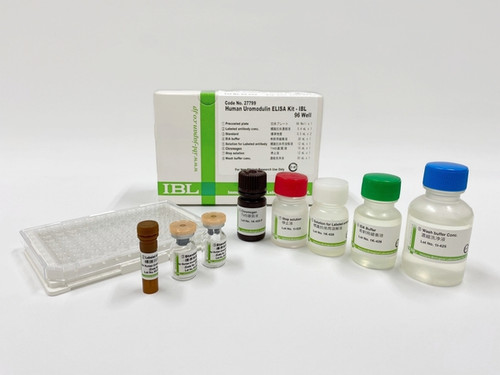Enzyme immunoassay for determination of CXCL9 concentrations in human serum, plasma, cell culture supernatant and other biological samples. For research use only, not for use in diagnostic procedures.
Uniprot ID: Q07325
CXCL9, also known as MIG, is one member of the ELR-negative CXC chemokine subfamily, and can be induced by IFN-γ. CXCL9 binds to its receptor CXCR3 and can recruit CXCR3+ cells, such as effector T cells, regulatory T cells (Tregs) and CD8+ cytotoxic T cells. CXCL9 is involved in immunoregulatory and inflammatory processes, but it also play a key role in tumor growth, angiogenesis, and metastasis.
- Assay Description:
- 90 min. incubation (37°C) + 60 min. (37°C) + 30 min. (37°C) + 20 min. (37°C) = 3 hours, 20 min. total incubation time
- Catalog number:
- IB08203
- configuration:
- 96 Determinations, 12x8 removable strips
- controls:
- None provided
- design:
- Sandwich enzyme-linked immunesorbent assay (ELISA) technique
- FDA Status:
- For research use only, not for use in diagnostic procedures
- Protocol:
- notes:
- The protocol for this product (see above) is intended to serve as an example only. Please refer to the Instructions For Use provided with the assay kit for precise details.
- Other names:
- Chemokine (C-X-C motif) ligand 9 (CXCL9), MIG, SCYB9, Monokine induced by interferon-gamma
- Sample types:
- Human serum, plasma, cell culture supernatant and other biological samples
- Sample volume:
- 100 μL of properly diluted unknown / determination
- standards:
- 8 standards, serially diluted from 1 prepared lyophilized standard
- Standard range:
- 0 / 31.25 - 2000.0 pg/mL
- storage:
- 2 - 8 °C
- sensitivity:
- 18.75 pg/mL
- Species:
- Human







